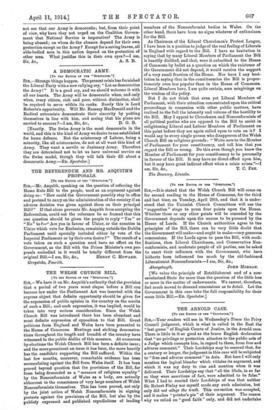THE WELSH CHURCH BILL.
(To THE EDITOR Or THE ..Eraorrros...] SIR,—We have it on Mr. Asquith's authority that the provision that a period of two years must elapse before a Bill can become law under the Parliament Act was inserted with the express object that definite opportunity should be given for the expression of public opinion in the country on the merits of such a Bill; and such expression, it was implied, would be taken into very serious consideration. Since the Welsh Church Bill was introduced there has been abundant and most definite expression of opposition to that Bill. Great petitions from England and Wales have been presented to the House of Commons. Meetings and striking demonstra- tions throughout the length and breadth of the country have witnessed to the public dislike of this measure. At numerous by-elections the Welsh Church Bill has been a definite issue; and the more prominent an issue it has been, the more heavily has the candidate supporting the Bill suffered. Within the last few months, moreover, remarkable evidence has been accumulating against the Bill from Wales itself. It has been proved beyond question that the provisions of the Bill, far from being demanded as a "measure of religions equality" by the Nonconformists of Wales as a body, are actually abhorrent to the consciences of very large numbers of Welsh Nonconformists themselves. This has been proved, not only by the joint action of Welsh Nonconformists in signing protests against the provisions of the Bill, but also by the publicly expressed and published repudiations of leading members of the Nonconformist bodies in Wales. On the other band, there have been no signs whatever of enthusiasm for the Bill.
As Chairman of the Liberal Churchmen's Protest League, I have been in a position to judge of the real feeling of Liberals in England with regard to the Bill. I have no hesitation in saying that by many Liberal Members of Parliament the Bill is heartily disliked, and that, were it submitted to the House of Commons by ballot as a question on which the existence of the Government did not depend, it would receive the support of a very small fraction of the House. Nor have I any hesi- tation in saying that in the constituencies the Bill is propor- tionately even less popular than in the House of Commons. Liberal Members have, I am quite certain, sore misgivings on the wisdom of the policy.
But I do not think that even yet Liberal Members of Parliament, with their attention concentrated upon the critical proceedings in connexion with other public matters, have realized to the full the intensity and volume of the hostility to the Bill. May I appeal to Churchmen and Nonconformists of all political parties who are opposed to the Bill to assist in enlightening Liberal and Labour Members of Parliament on this point before they are again called upon to vote on it ? I would say to every single person who disapproves of the Welsh Church Bill on religious grounds : "Write now to the Member of Parliament for your constituency, and tell him that you regard the Bill as wrong. Do this even though you know the Member of Parliament for your constituency to be personally in favour of the Bill. It may have no direct effect upon him, but it may have great indirect effect when a crisis arises."—!






































 Previous page
Previous page